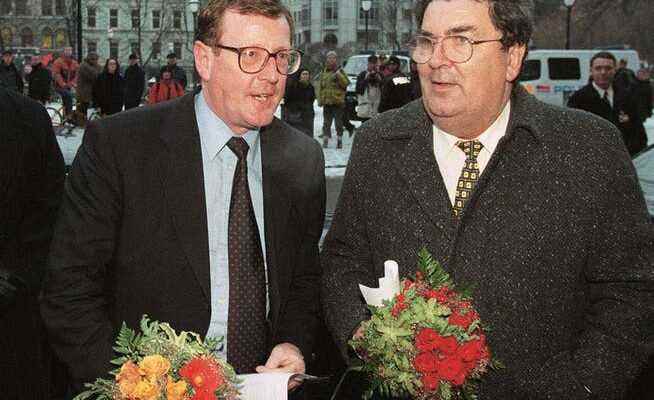With the passing of former Regional President David Trimble, Northern Ireland has lost an architect of the Good Friday Agreement. His willingness to make compromises against resistance from his own camp would be in demand again today in Northern Ireland.
Unionist David Trimble (left) and nationalist John Hume received the Nobel Prize in Oslo in 1998 for their commitment to peace in Northern Ireland.
Great politicians are often characterized by their ability to leap over their own shadow. The staunch Unionist David Trimble, who died on Monday at the age of 77 after a short illness, demonstrated this willingness. In May 1998 Trimble performed with his Catholic counterpart John Hume in Belfast at a concert by the band U2to campaign for a Yes to the Good Friday Agreement in the referendum. Trimble, who preferred to listen to Wagner privately and, as a member of the Orange Order, liked to play marching music, found himself in an unfamiliar environment, and not just on stage. Politically, too, he moved far outside of his comfort zone, having shortly before helped Hume to break through the peace agreement.
merits for peace
Despite fierce opposition from Trimble’s unionist camp, a majority of over 70 percent in Northern Ireland approved the Good Friday Agreement. The treaty regulates the power-sharing between unionists and nationalists, leaves a united Ireland open as an option and prepares for the disarmament of Catholic and Protestant underground fighters. In the preceding decades, the conflict had claimed more than 3,000 lives. The guns have been silent since 1998.
Hume and Trimble, who died a year ago, were considered the architects of the Good Friday Agreement and were awarded the Nobel Peace Prize in autumn 1998. In response to Trimble’s death, former US President Bill Clinton also underlined his services to peace, as did former British Prime Minister Tony Blair, former Irish Prime Minister Bertie Ahern and incumbent politicians across all party lines.
Scorned as “Judas”.
David Trimble’s path to becoming a peacemaker was not mapped out. He was born outside of Belfast in 1944, the son of a civil servant whose Protestant ancestors had migrated to Northern Ireland from Northumberland in the 1600s. Trimble studied law and joined the Ulster Unionist Party (UUP), which shaped politics in Northern Ireland for decades.
quick he advanced to become one of the most hot-blooded and radical unionists. In 1995, the young hardliner ran for the presidency of the UUP and defeated his more moderate opponents. It was all the more surprising that he of all people worked out a peace solution with the Catholic nationalists.
Trimble was subsequently elected Northern Ireland’s first regional president, presiding over the institutions created by the Good Friday Agreement. But he paid a high price. In his Portadown constituency he was scorned as ‘Judas’ and soon he was as hated by the London Loyalists as by the Nationalists.
institutions survive
In 2005, the radical Democratic Unionist Party (DUP), critical of the Good Friday Agreement, replaced the UUP as the strongest party in the unionist camp. In the nationalist camp, the radical Sinn Fein advanced to become the largest formation in place of John Hume’s Social Democrats. Trimble lost power, but the institutions he built survived. Contrary to their announcements, the DUP and Sinn Fein formed a regional government. Trimble, who was knighted in 2016, would later describe it as “delicious irony”. designaten.
As a result of Brexit, tensions between religious groups have increased again. In the spring elections, Sinn Fein rose to become the strongest force in Northern Ireland, but the DUP is blocking the formation of a government because of the dispute over the Northern Ireland Protocol. Perhaps the commemoration of David Trimble reminds actors in Belfast, London and Brussels that sometimes it is necessary to jump over one’s own shadow.
